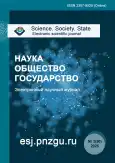Religious and moral foundations of the socio-philosophical teaching of classical Eurasians
- Authors: Isaeva O.S.1
-
Affiliations:
- Penza State University
- Issue: No 2 (2025)
- Pages: 122-131
- Section: HISTORY OF PHILOSOPHY
- URL: https://journal-vniispk.ru/2307-9525/article/view/301352
- DOI: https://doi.org/10.21685/2307-9525-2025-13-2-12
- ID: 301352
Cite item
Full Text
Abstract
Background. The appeal to religion and moral constants in the management of public education is one of the characteristic trends in the development of modern Russia and has deep roots in Russian philosophical thought. One of the branches that established and implemented religious and moral principles in their philosophy is classical Eurasianism, which took shape in Russian philosophy abroad in the 1920s. Representatives of this philosophical branch held the idea that religion and morality should invariably permeate all spheres of human society, acting as the basis for the behaviour of each personality. The purpose of this article is to analyze the religious and moral foundations of Eurasian philosophy and their specific manifestations in various spheres of social reality. Materials and methods. Achieving the purpose of this study involves studying the works of participants in classical Eurasianism, as well as articles by modern authors who have turned to the analysis of the philosophical teachings of classical Eurasians. In the course of the work, the author used the principles of integrity, consistency and structure. The methodology of this research includes the method of historical reconstruction, the concrete historical method. Results. The article analyzes the metaphysical doctrine of L.P. Karsavin symphonic personality from the perspective of substantiating in it the religious and moral foundations of human behavior in the philosophy of Eurasians. From the position of carrying out the principle of conciliarity embedded in L.P. Karsavin's concept, N.N. Alekseev's doctrine of a guaranteed ideocratic state, N.S. Trubetskoy's views on the content of the idea of a ruler, and P.N. Savitsky's economic doctrine are considered. Conclusions. The author came to the conclusion that the religious and moral principles pursued by classical Eurasians in public and state life are the basis of the unity of Russia-Eurasia in their teaching. In the modern world, they can serve as guidelines for stabilizing the value system in Russia and ensuring the spiritual unity of citizens.
About the authors
Oksana S. Isaeva
Penza State University
Author for correspondence.
Email: okcana_isaeva@mail.ru
Сandidate of Philosophical Sciences, Associate Professor, Associate Professor of the Department of Philosophy and Social Communications
40 Krasnaya street, Penza, 440026References
- Maslin M.A. At the origin of Eurasianism. To the 100th anniversary of the publication of Prince Nikolai Trubetskoy's book "Europe and Humanity". Filosofskiy zhurnal = Philosophical journal. 2019;12(4): 161‒178. (In Russ.). doi: 10.21146/2072-0726-2019-12-4-161-178
- Vakhitov R.R. Two miracles at the birth of the myth of Eurasianism. Khristianskoe chtenie = Christian reading. 2021;(2):206–215. (In Russ.). doi: 10.47132/1814-5574_2021_2_206
- Logovikov P.V. Scientific tasks of Eurasianism. Utverzhdenie evraziytsev. Kn. 7.: Tridtsatye gody: sb. st. = The assertion of the Eurasians. Book 7: The Thirties: a collection of articles. Parizh: Izd-vo evraziytsev, 1931:53‒64. (In Russ.)
- Vakhitov R.R. Synthetic image of Russia-Eurasia. Mir Rossii = The world of Russia. 2019;28(4): 193–200. (In Russ.). doi: 10.17323/1811-038X-2019-28-4-193-200
- Isaeva O.S. Justification of the integrity and unity of the Russian-Eurasian world in the social project of classical Eurasianism. Izvestiya vysshikh uchebnykh zavedeniy. Povolzhskiy region. Gumanitarnye nauki = University proceedings. Volga region. Humanities. 2014;(1):109‒20. (In Russ.)
- Gumilev L.N. Notes of the Last Eurasian. Nashe nasledie = Our heritage. 1991;(3):19‒26. (In Russ.)
- Isaeva O.S. Classical Eurasianism Variations During the Second Half of the 20th and Early-21st Centuries. Utopia y Praxis Latinoamericana. 2020;25(Extra10):354‒367. doi: 10.5281/zenodo.4155672
- Isaeva O.S. The Role of Orthodoxy in the fate of Russia in the philosophy of classical Eurasianists and neo-Eurasianist A.S. Panarin. Nauka. Obshchestvo. Gosudarstvo = Science. Society. State. 2024;12(4): 118–127. (In Russ.). doi: 10.21685/2307-9525-2024-12-4-11
- Isaeva O.S. The image of Russia in the philosophy of classical Eurasianists and the neo-Eurasian teaching of A.G. Dugin. Nauka. Obshchestvo. Gosudarstvo = Science. Society. State. 2023;11(4):99–109. (In Russ.). doi: 10.21685/2307-9525-2023-11-4-10
- Savitskiy P.N. Eurasianism. Russkiy uzel evraziystva. Vostok v russkoy mysli: sb. tr. Evraziytsev = Russian knot of Eurasianism. The east in Russian thought: collected works of Eurasians. Moscow: Belovod'e, 1997:76–94. (In Russ.)
- Vernadskiy G.V. Nachertanie russkoy istorii = Outline of Russian history. Moscow: Algoritm, 2008:331. (In Russ.)
- Savitskiy P.N. Kontinent Evraziya = Continent of Eurasia. Moscow: Agraf, 1997:461. (In Russ.)
- Karsavin L.P. Malye sochineniya = Short essays. Saint Petersburg: Aleteyya, 1994:532. (In Russ.)
- Karsavin L.P. Fundamentals of politics. Rossiya mezhdu Evropoy i Aziey: Evraziyskiy soblazn: Antologiya: sb. st. = Russia between Europe and Asia: Eurasian temptation: Anthology: collection of articles. Moscow: Nauka, 1993:174–217. (In Russ.)
- Alekseev N.N. Russkiy narod i gosudarstvo = Russian people and state. Moscow: Agraf, 1998:635. (In Russ.)
- Trubetskoy N.S. Nasledie Chingiskhana = The Legacy of Genghis Khan. Moscow: Eksmo, 2007:554. (In Russ.)
- Trubetskoy N.S. Istoriya. Kul'tura. Yazyk = History. Culture. Language. Moscow: Progress, 1995:797. (In Russ.)
Supplementary files

















